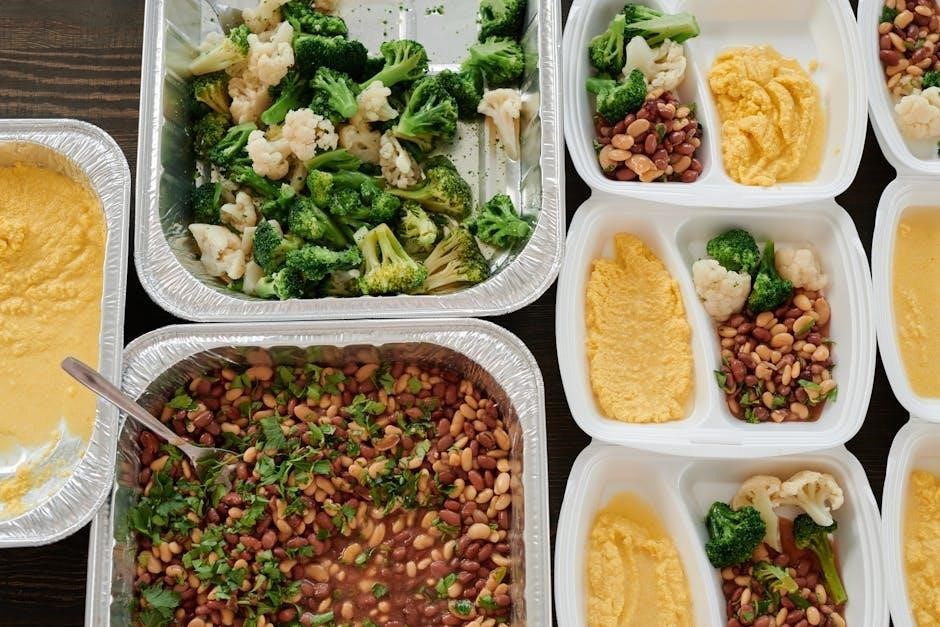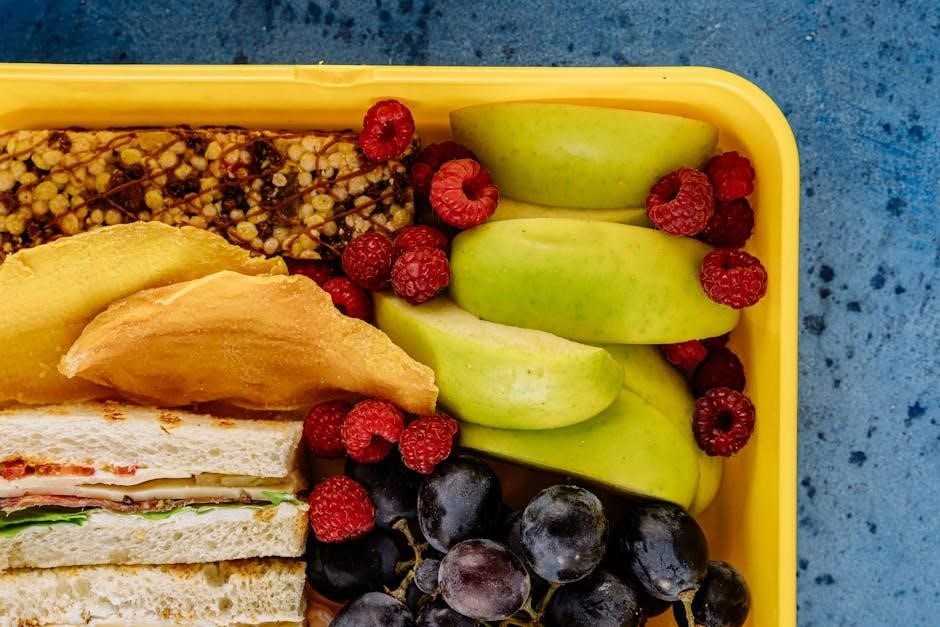Marathon Meal Plan: Week Before the Race
Start with carbohydrate loading 7-10 days before the race to maximize glycogen stores. Focus on complex carbs, lean proteins, and vegetables. Avoid high-fiber and processed foods to prevent digestive discomfort. Include foods like whole grains, lean meats, and fish. Stay hydrated with water and electrolyte-rich drinks to maintain optimal performance.
Proper nutrition is essential for optimal performance and recovery during marathon training. A well-structured meal plan ensures you maximize your training efforts, prevent fatigue, and maintain overall health. By focusing on balanced meals rich in carbs, protein, and essential nutrients, you can fuel your body for endurance and speed. Neglecting nutrition can lead to underperformance or health issues, making it crucial to plan carefully. This guide provides a comprehensive approach to meal planning, tailored for marathon success.
Importance of Nutrition in the Final Week
Nutrition in the final week before a marathon is critical for peak performance. Proper fueling ensures your body has enough energy stores, minimizing fatigue and preventing muscle cramps. Carbohydrates are key for glycogen loading, while proteins support muscle repair. Hydration is also vital to maintain fluid balance. A well-balanced diet during this period helps avoid stomach issues and ensures you feel your best on race day. Neglecting nutrition can lead to poor performance and discomfort, making it essential to plan carefully.

Carbohydrate Loading: A Key Strategy
Carbohydrate loading maximizes glycogen stores, enhancing endurance. Start 7-10 days before the race, focusing on complex carbs like pasta, rice, and whole grains. Stay hydrated with electrolyte-rich drinks to support energy levels and prevent dehydration, ensuring optimal performance on race day.
What is Carbohydrate Loading?
Carbohydrate loading is a dietary strategy to maximize glycogen stores in the muscles and liver. It involves increasing carbohydrate intake 7-10 days before the race to enhance endurance. Focus on complex carbs like pasta, rice, and whole grains, while reducing fiber and processed foods to avoid digestive issues. Proper hydration with electrolyte-rich drinks supports this process, ensuring energy levels are maintained throughout the race. This method is crucial for long-distance runners to optimize performance and delay fatigue.
How to Implement Carbohydrate Loading
To implement carbohydrate loading effectively, start 7-10 days before the race. Focus on consuming complex carbs like pasta, rice, and whole grains. Pair these with lean proteins to maintain balance. Avoid high-fiber foods to prevent digestive discomfort. Stay hydrated with water and electrolyte-rich beverages to support glycogen storage. Incorporate carb-rich snacks between meals to keep energy levels steady. Aim for 8-12 grams of carbs per kilogram of body weight daily to maximize endurance and performance during the race.

Protein Intake for Muscle Repair
Protein is crucial for muscle repair and recovery. It helps rebuild tissues and reduces soreness, ensuring optimal performance. Aim for 1.2-1.6 grams per kilogram of body weight daily.
Role of Protein in Marathon Preparation
Protein plays a vital role in muscle repair and recovery during marathon training. It helps rebuild muscle fibers damaged during intense workouts, reducing soreness and enhancing performance. Adequate protein intake supports muscle synthesis, strength, and endurance. Additionally, it aids in maintaining immune function, crucial for preventing illness during high-intensity preparation. Balancing protein with carbohydrates and fats ensures sustained energy and overall nutritional needs, making it a cornerstone of a runner’s diet in the final weeks before the race.
Best Protein Sources for Runners
Lean meats like chicken and turkey, fish such as salmon, and eggs are excellent protein sources for runners. Dairy products, including Greek yogurt and cottage cheese, provide high-quality protein. Plant-based options like beans, lentils, and quinoa are also ideal. Nuts and seeds offer convenient protein-rich snacks. These foods support muscle repair, energy production, and overall recovery, making them essential for a runner’s diet during race preparation.

Hydration Strategies
Proper hydration is key to performance. Aim for 8-10 glasses of water daily, adjusting for sweat loss. Hydrate 2-3 hours before running and avoid overhydration;
Why Hydration Matters
Hydration is essential for maintaining bodily functions, physical performance, and recovery. Even mild dehydration can impair endurance, causing fatigue, dizziness, and muscle cramps. Proper fluid intake ensures optimal blood flow, delivering oxygen and nutrients to muscles. It also regulates body temperature and supports digestion. During intense training, runners lose significant water through sweat, making consistent hydration critical to avoid performance decline and health risks. Prioritizing water intake helps sustain energy levels and overall marathon readiness.
Practical Tips for Staying Hydrated
Drink water regularly throughout the day, aiming for 8-10 glasses. Monitor urine color; pale yellow indicates proper hydration. Carry a reusable water bottle to track intake. Include electrolyte-rich drinks like coconut water or sports beverages to replenish lost salts. Avoid alcohol and caffeine, which dehydrate. Eat water-rich foods like fruits and vegetables. Set reminders to drink water, especially before and after training sessions. Adjust intake based on sweat levels and weather conditions to stay optimally hydrated.

Fiber and Sugar Intake
A balanced intake of fiber and sugar supports digestion and energy levels. Fiber aids in preventing digestive issues, while controlled sugar intake provides sustained energy for training and recovery.
Managing Fiber Consumption
Managing fiber intake is crucial during the final week of marathon preparation. Reduce high-fiber foods like whole grains, legumes, and raw vegetables to minimize digestive discomfort. Opt for low-fiber alternatives such as white bread, pasta, and cooked vegetables to avoid stomach issues. Stay hydrated to help fiber move through your system. Avoid sudden changes in fiber intake to prevent bloating or cramps. Balance is key to maintaining energy and digestive health without compromising performance.
Balancing Sugar Intake for Energy
Balancing sugar intake is vital for maintaining energy levels during marathon training. Focus on consuming natural sugars from fruits, vegetables, and complex carbs, which provide sustained energy. Avoid excessive refined sugars to prevent energy crashes. Timing is key—consume easily digestible carbs with a touch of sugar 1-3 hours before runs. Stay hydrated and pair sugars with protein for balanced energy; Avoid overloading on race week to prevent digestive discomfort and maintain optimal performance.

Race Week Nutrition Strategy
Focus on carbohydrate-rich meals, moderate protein, and minimal fiber to optimize energy. Stay hydrated, avoid heavy meals, and maintain consistent eating patterns to support performance.
Meal Frequency and Timing
During race week, maintaining consistent meal frequency and timing is crucial for optimal energy levels. Aim for three main meals and two to three snacks daily, spaced evenly to prevent energy dips. Breakfast should be consumed 2-3 hours before running, while dinner the night before the race should be light and rich in carbohydrates to maximize glycogen stores. Staying hydrated by drinking water regularly throughout the day is also essential for peak performance.
Portion Control and Caloric Needs
Portion control is vital to avoid overeating while meeting energy demands. Caloric needs increase slightly during race week but should align with activity levels. Aim for balanced meals with complex carbs, lean proteins, and healthy fats. Adjust portion sizes based on individual energy expenditure, ensuring adequate fuel without excess. Avoid overloading on high-calorie foods that may cause digestive discomfort. Eat until satisfied, not stuffed, and tailor portions to maintain consistent energy levels throughout the day.

Sample Meals for the Final Week
Sample meals provide structured eating plans, ensuring balanced nutrition and energy optimization. They include varied, nutrient-dense options to support performance and recovery, tailored to marathon demands.
Breakfast Ideas
Opt for high-carb, protein-rich breakfasts to fuel your runs. Consider oatmeal with banana and almond butter, whole-grain toast with avocado and scrambled eggs, or Greek yogurt with berries and honey. Smoothies with spinach, mango, and protein powder are also excellent. These meals provide sustained energy, support muscle repair, and are gentle on the stomach. Avoid heavy or high-fiber options to prevent digestive discomfort during training. Keep portions moderate to maintain energy levels without feeling overly full.
Lunch and Dinner Suggestions
Focus on balanced meals with complex carbs, lean proteins, and vegetables. For lunch, try whole-grain pasta with turkey, steamed veggies, or grilled chicken wraps with brown rice. Dinners could include baked salmon with sweet potatoes and broccoli or quinoa stir-fries with lean beef and mixed greens. Avoid heavy, spicy, or high-fiber foods to prevent digestive discomfort. Stay hydrated and adjust portion sizes based on your energy needs and training intensity.

Avoiding Common Mistakes
- Avoid overeating or trying new foods that may cause stomach issues.
- Don’t overload on high-fiber or high-fat meals during race week.
- Stay hydrated but avoid excessive water intake that leads to bloating.
Foods to Avoid
During the final week before a marathon, it’s crucial to avoid foods that may disrupt digestion or cause discomfort. Steer clear of high-fiber foods like beans, broccoli, and Brussels sprouts, as they can lead to bloating or digestive distress. Spicy, fatty, or heavy meals should also be avoided to prevent stomach upset. Limit caffeine and alcohol, which can dehydrate the body. Additionally, avoid sugary snacks that may cause energy crashes. Opt for bland, easily digestible foods to ensure peak performance on race day.
Common Nutrition Pitfalls
One of the most common mistakes runners make is overloading on carbohydrates too late, leading to bloating. Another pitfall is inadequate hydration, which can impair performance. Some runners also underestimate the importance of electrolytes, risking cramps. Inconsistent eating habits and neglecting protein intake are additional errors. Overconsumption of fiber before the race can cause digestive discomfort, while others may skip meals entirely, leading to low energy levels. Proper planning is essential to avoid these mistakes and ensure optimal performance.
Supplements and Electrolytes
Supplements and electrolytes are crucial for maintaining hydration and preventing cramps during intense training. They help replenish lost salts and optimize performance.
Role of Supplements
Supplements play a vital role in filling nutritional gaps and enhancing performance. For runners, they often include multivitamins, iron, and electrolytes to prevent deficiencies and support energy production. Electrolyte tablets or powders help maintain fluid balance, reducing the risk of dehydration and muscle cramps. Supplements like beta-alanine and branched-chain amino acids (BCAAs) can also aid in delaying fatigue and muscle recovery. Always consult a healthcare provider before adding new supplements to your routine.
- Multivitamins for overall health.
- Electrolytes to prevent dehydration.
- Iron for oxygen delivery.
- BCAAs for muscle recovery.
Electrolyte Balance
Electrolytes, such as sodium, potassium, and magnesium, are essential for maintaining fluid balance and nerve function. During intense training, excessive sweating can deplete these minerals, leading to cramps and fatigue. Incorporate electrolyte-rich foods like bananas, dates, and coconut water into your meals. Sports drinks can also help replenish lost salts. Avoid overconsumption, as it may cause bloating or hypernatremia. Balance is key to optimizing performance and preventing dehydration-related issues.
- Sodium for sweat replacement.
- Potassium for muscle function.
- Magnesium to prevent cramps.

Mental Preparation Through Nutrition
Nutrition plays a crucial role in mental clarity and focus. A balanced diet rich in complex carbs, lean proteins, and healthy fats supports brain health and reduces anxiety. Proper hydration and avoiding heavy meals prevent energy crashes, keeping your mind sharp for race day.
- Complex carbs for steady energy.
- Proteins to stabilize mood.
- Healthy fats for brain function.
Building Confidence with Diet
Consistency in your diet builds mental resilience, ensuring your body is fueled for peak performance. A well-structured meal plan provides a sense of control and readiness, boosting confidence. Balanced nutrition reduces race-day anxiety, as runners feel physically prepared. Prioritizing nutrient-dense foods helps maintain energy levels, fostering a positive mindset. This structured approach reinforces the belief in your training and ability to tackle the marathon, mentally and physically.
Mindful Eating Practices
Mindful eating involves savoring each bite, focusing on flavors, and listening to your body’s hunger cues. This practice helps runners avoid overeating and ensures proper digestion. During race week, prioritize whole, nutrient-dense foods and avoid distractions while eating. Stay hydrated by sipping water between meals, but not excessively before or during meals. Mindful eating promotes a positive relationship with food, enhancing mental clarity and physical performance, which is crucial in the final days before the marathon.
Post-Meal Recovery
Post-meal recovery focuses on refueling and muscle repair after training. Aim for a balanced mix of carbohydrates and protein within 30-60 minutes post-exercise to replenish glycogen stores and support muscle recovery, essential for optimal performance in the final days before the marathon.
Recovery Nutrition
Recovery nutrition is crucial for replenishing energy stores and repairing muscles after intense training. Focus on consuming a mix of carbohydrates and protein within 30-60 minutes post-workout to optimize recovery. Aim for a 3:1 ratio of carbs to protein, such as a banana with peanut butter or a protein shake with fruit. Additionally, incorporate anti-inflammatory foods like berries and omega-3 rich sources to reduce muscle soreness. Stay hydrated with water or a sports drink to support overall recovery and prepare your body for the next training session.
Timing of Recovery Meals
Timing recovery meals is essential for optimal muscle repair and energy replenishment. Aim to consume a recovery meal or snack within 30-60 minutes post-workout, when your body is most efficient at absorbing nutrients. This window helps restore glycogen stores and supports muscle recovery. Include a mix of carbohydrates and protein, such as a protein shake with fruit or a banana with peanut butter. Consistency in timing ensures your body is prepared for the next training session and reduces muscle soreness.

Race Morning Nutrition
On race morning, fuel with a light, high-carb meal 2-3 hours before start time. Opt for familiar, easily digestible foods like oatmeal or toast. Stay hydrated with water or electrolyte drinks to maintain energy levels without stomach discomfort.
What to Eat on Race Morning
Opt for a high-carb, low-fiber breakfast 2-3 hours before the race to avoid digestive discomfort. Choose familiar foods like oatmeal, whole grain toast, or a banana. Include a small portion of protein, such as an egg or yogurt, for sustained energy. Avoid heavy, fatty, or spicy meals. Stay hydrated with water or a sports drink. Avoid caffeine and high-sugar foods that might cause energy crashes. Keep portions modest to prevent bloating and ensure smooth digestion during the race.
Timing of the Final Meal
Eat your final pre-race meal 2-3 hours before the marathon to allow proper digestion. Opt for a high-carb, moderate-protein meal low in fiber and fat, such as oatmeal with fruit or whole grain toast with a banana and peanut butter. Avoid heavy or fatty foods that may cause indigestion. Stay hydrated with water or a sports drink but avoid overloading to prevent bathroom breaks. Ensure the meal is familiar and minimizes stomach discomfort during the race.
A well-structured marathon meal plan is crucial for optimal performance. By focusing on carbohydrate loading, balanced protein intake, and proper hydration, runners can enhance endurance and reduce fatigue. Avoiding high-fiber and sugary foods, while timing meals correctly, ensures comfort and energy. Consistency and personalized nutrition are key. Trusting the plan and staying disciplined will build confidence, helping runners feel prepared and fueled for race day. Proper nutrition is the cornerstone of a successful marathon experience.